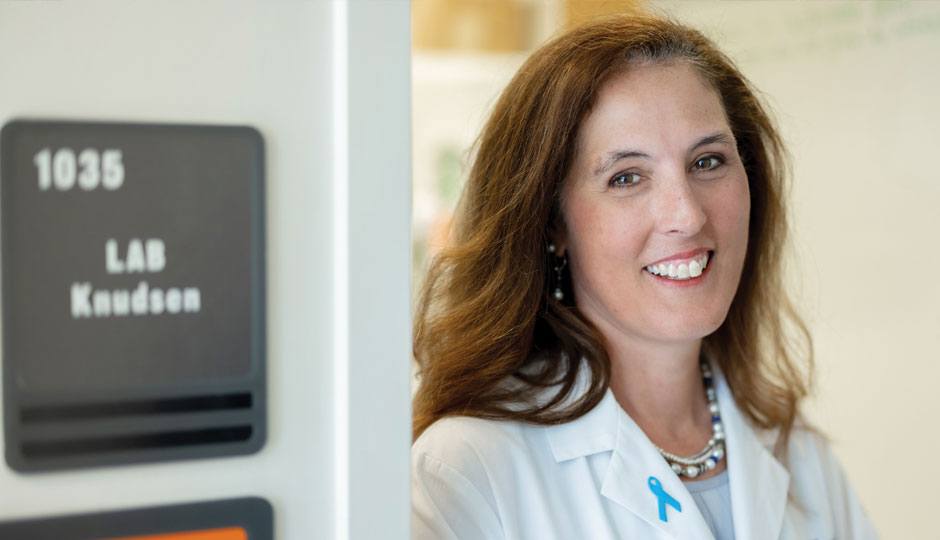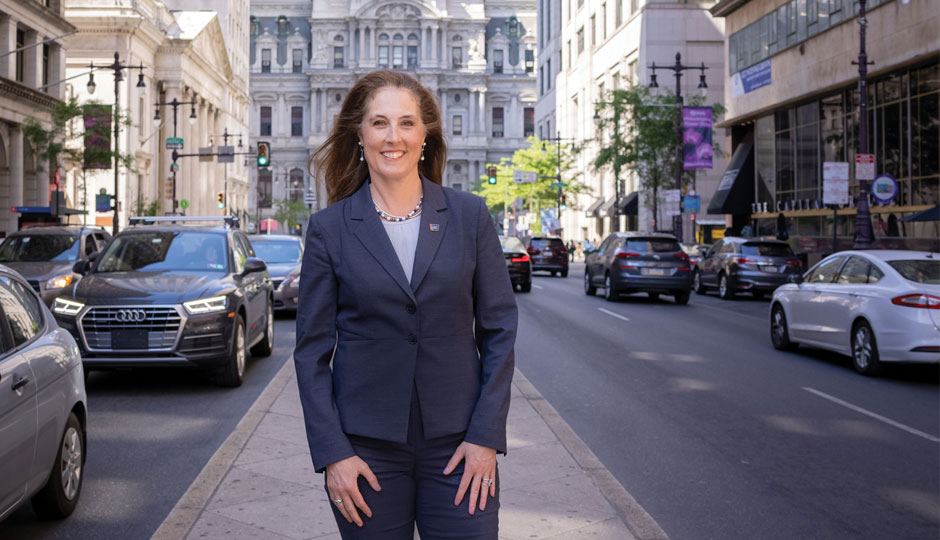New American Cancer Society CEO Dr. Karen E. Knudsen Hits the Ground Running

Dr. Karen E. Knudsen is no stranger to blazing trails. The Wynnewood resident has a background in oncology and clinical cancer research, both fields where men vastly outnumber women. Most recently, she served as executive vice president of oncology services and enterprise director for the Sidney Kimmel Cancer Center at Jefferson Health. She’s also held leadership roles with some of the most important cancer institutions in the nation, including the Association of American Cancer Institutes.
Now, she’s become both the first woman and the first oncology researcher in the modern era to lead ACS. And, in another first, she has some serious Philadelphia ties. She’s the first ACS CEO to work out of the Philly office and is a Temple Owl — she holds an MBA from Temple’s Fox School of Business.
Knudsen spoke with us about plans to close the racial gap in cancer outcomes, what makes her hopeful about cancer research, and what she loves most about our city.
How will your background in oncology impact your plans for the future of ACS?
I have first-hand understanding of where the gaps are in cancer research and care, which I can convert into action items and priorities at ACS. When I led cancer services for a 14-hospital system, 16 percent of our patients in any given year missed therapy because they had no transportation. Things as simple as that underlie some of the vast disparities in cancer care and outcomes that happen not only here in Philadelphia, but all across the country.
Equity is a huge hurdle in cancer prevention and treatment. What do you see as ACS’s role in disrupting cancer disparities?
We’ve made a lot of progress against cancer, but it hasn’t always benefited everyone. ACS sees itself as a key catalyst to make sure that it does. Although incidence is about the same for women with breast cancer, Black women have a 40 percent higher death rate. Our research has long shown those gaps, and we’re always pushing research and advocacy priorities to that end. Patient support is also crucial, because some of that gap can be attributed to lack of transportation, housing and access to advancements that have happened.
While none of that is new for ACS, there’s another component where we really have made a dramatic shift, and that is diversity within oncology research and oncology care itself. There’s been a push nationally-and ACS has been part of this — to try to increase diversity in the pipeline for both MDs and PhDs going into oncology. Right now, it’s not where it needs to be, and so we’re partnering with many minority-serving institutions to give funds for students who are at the undergraduate level to get more experience in cancer research, as well as a vision of what it looks like to become an oncologist.
How has COVID· 19 impacted cancer care?
During COVID-19, almost everyone all but shut down their screening programs. People are starting to come back in, but we haven’t made up for that year-long deficit. There’s a real concern across the country that we will find a lot of cancers late when they’re much more difficult to treat, and we will see a rise in cancer deaths as a result of that. So we’re really working hard with communities and health systems in all 50 states to promote the importance of screening and to work with the health systems to get their screening uptake higher. In addition to a national awareness campaign, we have toolkits that we developed through research that we deliver to health systems, and we’ve seen a dramatic impact through those, especially at smaller health systems and practices that are struggling to get people back in.
What in cancer research is giving you the most optimism today?
The onset of immunotherapy has been a really terrific thing for some cancers, like lung cancer and melanoma, where we’re really starting to see just dramatic improvement in extending life. This is really key, there will be much more research on that front. On the other side of the continuum, we’re on the precipice of seeing breakthroughs in early detection, before a cancer can even be imaged, through something called a liquid biopsy.

Can you tell us what’s in the pipeline in terms of breast cancer research?
We are very focused on why we’re not seeing the gains across demographics. The mortality rate went down overall, but not for everyone. So why is there that gap? Without question, part of it is access, but that’s probably not all of it, and we really need to understand it. Our research units housed in Atlanta are focused on what we call a longitudinal study-taking healthy individuals, and studying them for a long period of time so that we can truly understand what were the factors that might have led to them having cancer. We’re hopeful these studies can help us understand what the many factors are which can impact someone’s risk of developing cancer, and especially for Black women, developing aggressive cancer.
This is a paid partnership between Think Pink and Philadelphia Magazine